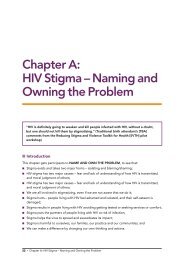Implementing Multiple Gender Strategies to Improve HIV and ... - ICRW
Implementing Multiple Gender Strategies to Improve HIV and ... - ICRW
Implementing Multiple Gender Strategies to Improve HIV and ... - ICRW
You also want an ePaper? Increase the reach of your titles
YUMPU automatically turns print PDFs into web optimized ePapers that Google loves.
society. This has been achieved through the formation of project advisory<br />
panels <strong>and</strong> partnership agreements with local community-based<br />
organizations.<br />
Local Involvement/<br />
Ownership<br />
Sonke has established relationships with local implementing partners <strong>and</strong><br />
integrates activities in local community structures <strong>and</strong> processes so the<br />
project can continue without Sonke involvement. The project has also<br />
provided input in<strong>to</strong>, <strong>and</strong> thus been embedded in<strong>to</strong>, local Integrated<br />
Development Plan (IDP) processes. The project engages, trains <strong>and</strong><br />
provides technical assistance <strong>to</strong> local stakeholders, in particular<br />
government officials, religious <strong>and</strong> traditional leaders, <strong>and</strong> local institutions<br />
<strong>to</strong> ensure project sustainability.<br />
Community participation in the program occurs through a project advisory<br />
panel <strong>and</strong> the involvement of youth in the development of IEC materials.<br />
Evaluation<br />
Methodology<br />
• Pre-/post-knowledge <strong>and</strong> opinion surveys: Pre-/post-surveys were<br />
conducted with participants on a range of indica<strong>to</strong>rs that determine<br />
whether men are in fact playing a more active role in meeting the carerelated<br />
needs of orphans <strong>and</strong> vulnerable children. The surveys<br />
assessed the amount of time men spend actively parenting their<br />
children; whether they assist their children with homework; use of<br />
physical punishment of children; underst<strong>and</strong>ing of alternatives <strong>to</strong><br />
corporal punishment; use of violence against children <strong>and</strong> their<br />
mothers; underst<strong>and</strong>ing of their children’s nutritional needs; what they<br />
do <strong>to</strong> ensure that children’s nutritional needs are met; <strong>and</strong> involvement<br />
in local childcare centers. <strong>Improve</strong>ments on these indica<strong>to</strong>rs should<br />
lead <strong>to</strong> an increased number of orphans <strong>and</strong> vulnerable children<br />
accessing social grants, attending school <strong>and</strong> demonstrating improved<br />
nutrition.<br />
• Case studies: Program staff plan <strong>to</strong> conduct <strong>and</strong> write up in-depth<br />
interviews/case studies with five men, five women, <strong>and</strong> five children per<br />
site at the beginning <strong>and</strong> end of the project <strong>to</strong> explore their perceptions<br />
of the intervention <strong>and</strong> underst<strong>and</strong> its impact on their lives.<br />
Evaluation Results • Project reach: A <strong>to</strong>tal of 989 people participated in training sessions in<br />
Nk<strong>and</strong>la (Kwazulu-Natal Province) <strong>and</strong> 1,079 in OR Tambo District<br />
(Eastern Cape Province).<br />
• Pre-/post-knowledge <strong>and</strong> opinion surveys: Evaluation results indicate<br />
substantial shifts in gender- <strong>and</strong> <strong>HIV</strong>/AIDS-related knowledge <strong>and</strong><br />
attitudes among those participating in project training sessions. For<br />
example, before the session with the Chwezi Traditional Court,<br />
100 percent of respondents believed that they had the right, as men, <strong>to</strong><br />
decide when <strong>to</strong> have sex with their partners. After the training,<br />
75 percent believed that they did not have the right <strong>to</strong> decide when <strong>to</strong><br />
have sex with their partners. The proportion of respondents who<br />
believed that they could get <strong>HIV</strong> from a deep kiss fell from 67 percent <strong>to</strong><br />
0 percent. Before the training session conducted with the Ekukhanyeni<br />
Tribal Authority, 63 percent of respondents believed that, under some<br />
circumstances, it is acceptable for men <strong>to</strong> beat their partners. Postsession,<br />
83 percent of respondents disagreed with this statement.<br />
Before the training, 96 percent of respondents believed that they should<br />
not interfere in other people’s relationships, even if there is violence.<br />
117
















